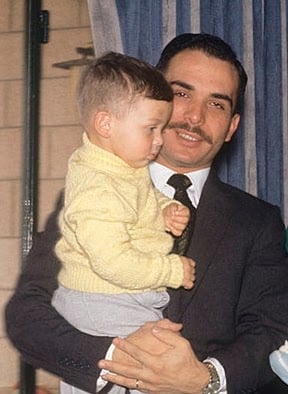The 1990s were a decade marked with intensive peace negotiations between Israel and its Arab neighbors. Although many efforts stalled, there was one exception: in 1994, Jordan’s King Hussein and Israeli Prime Minister Yitzhak Rabin signed a treaty that ended the state of war between both countries.
After years of fighting, Hussein’s life-long dream became reality and the survival of Jordan as a sovereign country was secured.
Three years later, after Jamal Al Jibiri had taken up a position at the U.S. Embassy as a Foreign Service National in the Economic Growth Office in Jordan, he learned that, as part of the peace process, the U.S. government had set aside $100 million for USAID in Jordan. He—as well as Economic Growth Director Jon Lindborg—had to rethink all of the economic growth engagement in the country. First up was a project called “Access to Micro Financing Implementation and Policy Reform.” Other projects soon followed.
Al Jibiri thinks of the twelve years he spent with USAID as the most productive time of his life. He was right in the middle of an economic reform process that he felt was just incredible. To this day, many people in the implementing partner community still talk about how one of USAID’s programs in Jordan managed to go from $12 million to $53 million.
Al Jibiri claims that King Abdullah II’s ascension to the throne in 1999 had everything to do with USAID’s success. In this “Moment” in U.S. diplomatic history, Al Jibiri discusses the favorable impact of the political climate on their economic growth portfolio.
Jamal Al Jibiri’s interview was conducted by Carol Peasley on December 27, 2017.
Read Jamal Al Jibiri’s full oral history HERE.
For a Moment on one of King Abdullah II’s predecessors click HERE.
Drafted by Ianthe Van Dyck
ADST relies on the generous support of our members and readers like you. Please support our efforts to continue capturing, preserving, and sharing the experiences of America’s diplomats.
Excerpts:
“The fact that Jordan survived as a country was his biggest accomplishment.”
The Ascension of King Abdullah II:
AL JIBIRI: Just to remind you, I started with USAID in February of 1997, and I think the one event that had the greatest impact on our economic portfolio was the ascension of King Abdullah II to the throne in 1999 after his majesty King Hussein passed away. If I was to look back on those days …, I thought that King Hussein’s greatest accomplishment was the survival of Jordan as a sovereign country for as long as he did. He took over in the 1950s, and for the longest time he was operating in a neighborhood where the most powerful forces didn’t think Jordan deserved to be a country.
The fact that Jordan survived as a country was … his biggest accomplishment. He was always much more of a political animal than, say, someone who was overly concerned about the economy. I think that with the arrival of King Abdullah in 1999, he started off with an immediate focus on improving the standard of living for Jordanians. It was the core of almost everything that happened. His Majesty’s concern recognized that after a long period, the survival of Jordan seemed assured; now we need to develop economically and become self-sufficient.
“It appeared that King Abdullah had definitely understood that Jordan as it was structured historically was not going to be sustainable going forward.”
The Importance of Economic Growth:
Up until then, there were a lot of holdovers from what you can only describe as a command economy structure that evolved out of the Arab nationalism of the 1950s and 1960s, and the consequent socialist nature of most Arab economies at the time. In the 1980s, the transformation that was happening in the U.K. with Margaret Thatcher and the greater private sector focus of Ronald Reagan began to have an influence. By the 1990s, there was no question about the importance of economic growth and the importance of private sector growth and that kind of thing. That was overwhelmingly the discussion everywhere.
It appeared that King Abdullah had definitely absorbed that and understood that Jordan as it was structured historically was not going to be sustainable going forward. He basically started pushing many of the economic reform efforts, and this was right at the beginning of the U.S. government’s decision to massively increase its aid levels to Jordan. It had just started towards the end of 1997, so by the end of 1999 we had started to get used to the larger AID levels and we actually had the resources to come to the table to support the economic reforms that His Majesty King Abdullah was adamant about pushing.
An Ideal Moment:
So that was the great coincidence; it was great that it happened, and I think it brought USAID to the forefront of economic development in Jordan. It was an ideal moment. That moment has passed. The funding levels have stayed high; they’re still quite large and they’ve grown over the years, but the desire for economic reform has slowed as a result of pushback by the more traditional forces in the country. The economic reform effort has thus slowed down. For those several years, the five or six years we had sufficient resources to be able to respond to the actual desire by Jordan as a result of His Majesty’s decision to institute economic reforms in the country, was great. The greatest issue we faced was to determine the best kinds of projects to be able to respond to that demand.
TABLE OF CONTENTS HIGHLIGHTS
Education
BA in Finance and Banking, University of Tulsa 1982–1986
MA in Business Administration, University of Stirling 1992–1993
Joined USAID 1997
Abdoun Al Janoubi, Jordan—Foreign Service National 1997–2008

